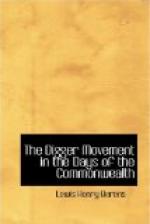(h) “They
hold that all men that are not of their congregation,
or that are revolted
from them, to be dead.”
(i) “They
hold that they ought to keep silence amongst
themselves, that the
liberty they have in the Lord may not be
espied of others.”
(k) “They
hold that no man should be put to death for his
opinion: therefore
they condemn Master Cranmer and Master Ridley
for burning Joan of
Kent.”
We shall have occasion to refer to some of these doctrines again later on. It may be well, however, to mention here that the views that no Christian ought to be a magistrate; that magistrates should not meddle with religion; that no man ought to be compelled to faith, or put to death for his religion; that war is unlawful to Christians; that their speech should be yea or nay, without any oath: seem to have been accepted by Anabaptists generally, as they were by the primitive Christian communists of the fourteenth century.[18:2]
To return to our immediate subject. To the development of religious and political thought in England, as to the inevitable struggle due to the inherent antagonism of Catholic and Protestant ideals and aspirations, we can refer only very briefly. The former can perhaps best be traced in the writings of three eminent theological writers, Jewel, Hooker, and Chillingworth. Though in 1567 we hear of the first instance of actual punishment of Protestant Dissenters, still during the earlier portion of the reign of Elizabeth, to the year 1571, there seems to have been a gradual growth of national sentiment toward a simpler form of worship, resulting in a modification of those rites and usages disliked by Protestants of all shades and sects, and against the established policy of forcible suppression of religious differences. In 1571, a Bill having been introduced imposing a penalty for not receiving the communion, it was objected to in the House of Commons on the grounds that “consciences ought not to be forced.” The same Parliament “refused to bind the clergy to subscription to three articles on the Supremacy, the form of Church Government, and the power of the Church to ordain rites and ceremonies, and favoured the project of reforming the Liturgy by the omission of superstitious practices."[19:1] In 1572, however, the appearance of Thomas Cartwright’s celebrated Admonition to the Parliament stemmed the course of religious reform, and produced a reaction of which Elizabeth and her Primates were not slow to avail themselves. The establishment, in 1583, of the Ecclesiastical Commission as a permanent body, wielding the almost unlimited powers of the Crown and creating their own tests of doctrine, put an end to the wise spirit of compromise which had hitherto characterised Elizabeth’s religious policy. The “superstitious usages” were encouraged; subscription by the clergy of the Three Articles, which the Parliament of 1571 had refused to enforce by law, was exacted; and the non-conforming clergy were relentlessly harried and persecuted: with the result that the Presbyterians within and the Puritans without the National Church were temporarily united by the pressure of a common persecution.




